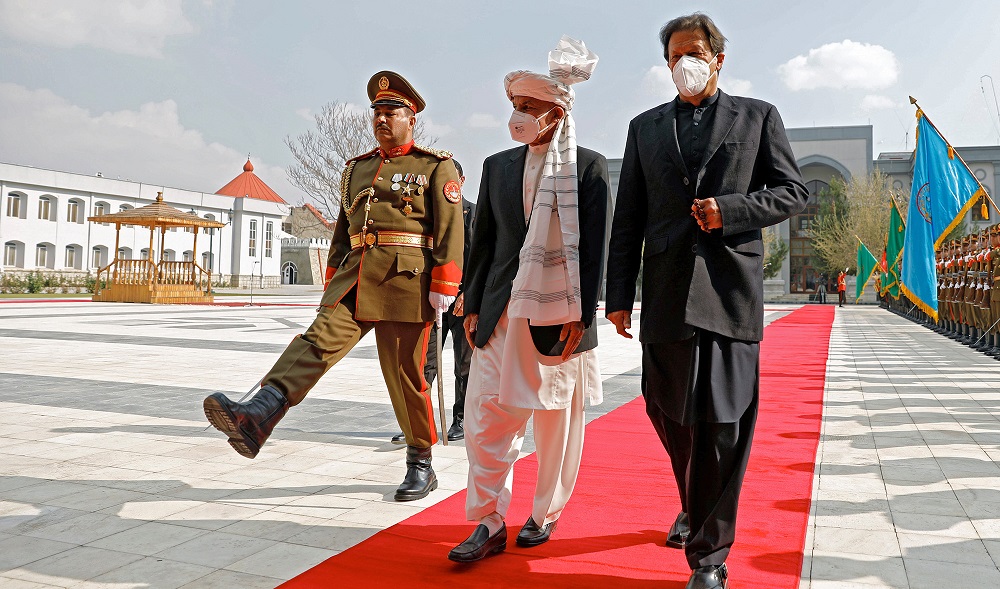PAKISTAN-AFGHANISTAN HIGH-LEVEL VISITS
In October, Engr Gulbuddin Hekmatyar, the head of Hizb-e-Islami Afghanistan and former Prime Minister of his country, visited Pakistan on the invitation of Prime Minister Imran Khan. Hekmatyar stayed in Pakistan for three days and met President Dr Arif Alvi, Prime Minister Imran Khan, Foreign Minister Shah Mehmood Qureshi and Speaker National Assembly Asad Qaisar. He also had meetings with leaders of various political parties. The foremost and important part of his visit was his address to a gathering of senior diplomats, academicians, journalists and researchers at an Islamabad-based think tank.
Engr Hekmatyar, while addressing the gathering, spoke his heart out and touched upon various aspects of Afghan war, the role of USA in destabilization of Afghanistan, failure of Nato & Isaf, proxy wars of regional states on Afghan land, political instability in Afghanistan, refugee crisis, Pakistan-Afghanistan cordial relationship and, last but not least, the Afghan peace process.
In his address, Engr Hekmatyar was of the opinion that Afghanistan has gained nothing from the wars in the past four decades or so. Infrastructure in Afghanistan has been destroyed, roads are broken, houses turned into ashes, economy run by foreign aid and funding, the country is politically instable and the social fabric has been torn apart. The Afghans are leading a chaotic life and their third generation is witnessing the ravages of war. However, he did not point out the beneficiaries of war economy and warlords that are still dominant in Afghan political landscape and are resistant to a change in the status quo.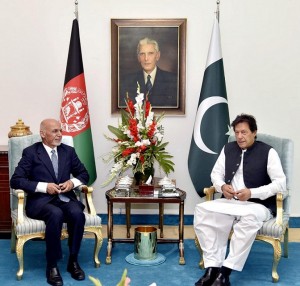
Moreover, Engr Hekmatyar termed American presence on Afghan soil since 2001 as a misadventure and said that Afghanistan proved to be the most difficult target for the Americans, Nato and Isaf. Afghan National Security Forces (ANSF) that has been trained by the Americans is facing desertions since Nato withdrawal. He added that all the regional states, including Pakistan, were, at that time, in favour of America’s invasion of Afghanistan but the time has changed now and no one in the region supports US stay there anymore. Condemning proxy wars being fought in Afghanistan, he warned that India should not use Afghan soil to destabilize Pakistan, or the US to hurt Russia, or Iran to harm Saudi Arabia. Criticizing India for committing atrocities in Jammu and Kashmir and denying the Kashmiris the right to decide their future, he advised Indians to learn from the defeat of the Soviet Union and Nato in Afghanistan.
While discussing the Intra-Afghan dialogue, Engr Hekmatyar also disclosed that talks between Taliban and Hizb-e-Islami will start very soon. This is undoubtedly good news as many people were suspecting the position of his group in case Afghan government and Taliban reach a political settlement. He was doubtful about America’s sincerity in restoring peace to Afghanistan and said that peace agreement with the Taliban was not the wish of American authorities; rather it was a kind of face-saving from their shameful defeat in Afghanistan. Declaring the re-election of President Ashraf Ghani a fraud and undemocratic, he predicted that the Ghani-led coalition will soon lose its credibility, and Afghanistan will need a broad-based and wide-encompassing national government in the near future. He appreciated Pakistan’s sincere, long-lasting support to Afghanistan in hard times.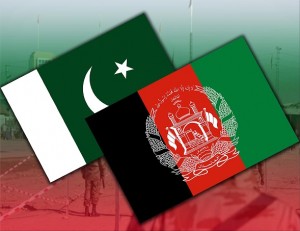
Some analysts have criticized Hekmatyar because of his harsh statements against the Afghan government, India and Iran as he has repeatedly accused them of derailing the peace process. They believe that his harsh language, hardcore approach, rigidity in terms of accommodating his opponents, lack of absorbing others and lackluster approach towards solving the issues through dialogue are still a part of his personality. But a leader like Hekmatyar, who is a survivor of several Afghan conflicts, starting from just before the Soviet invasion, throughout the USSR’s occupation of Afghanistan, and well after the American invasion of his country, will have the same approach. He is not a democratically-elected leader but a creation of war and hit by atrocities of war.
Prior to Hekmatyar’s visit, Dr Abdullah Abdullah, former CEO, and current Chairman of the High Council of National Reconciliation, also paid an official visit to Pakistan. His visit was a positive sign for intra-Afghan dialogue and Pakistani officials pledged to fully support Afghan government in the peace dialogue. Furthermore, apart from inviting political figures of Afghanistan, Pakistan invited officials from the Qatar office of the Taliban and then Taliban’s political interlocutor, Mullah Abdul Ghani Baradar, and other delegates visited Islamabad on August 24, 2020. In the ongoing year, many Afghan politicians and leaders representing their respective parties including Mohammad Muhaqiq were invited to Islamabad.
The frequent visits of Afghan leaders are the manifestation of Pakistan’s policy of having constructive diplomatic relations with the Afghan government, politicians and media. The basic agenda behind these initiatives is to bring all the Afghan factions on one table so that the intra-Afghan dialogue may prove fruitful. At this point of time, although there has been no considerable outcome of the Intra-Afghan dialogue, yet Pakistan is endeavouring to ensure a peaceful political settlement in Afghanistan by building a consensus among all the stakeholders.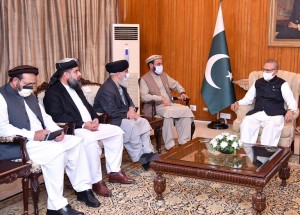
On the other hand, Pakistan’s Prime Minister Imran Khan has also visited Afghanistan on the invitation of Afghan president Dr Ashraf Ghani. He reached Kabul on November 20, and held a detailed meeting with Afghan president along with his delegation. Pakistan’s Foreign Minister Shah Mehmood Qureshi also met his Afghan counterpart. Addressing a joint press conference alongside Afghan President Ashraf Ghani at the Presidential Palace, Prime Minister Imran Khan said that the two countries have historical links. He said, “The idea of visiting at a time when violence is increasing [in Afghanistan] is to assure you, President Ghani, that the people and the government of Pakistan have only one concern; peace in Afghanistan.” Mr Khan offered this country’s full support when he told the Afghan side that if “Pakistan can help, please let us know”.
During the premier’s visit, the two countries jointly issued a document titled ‘Shared vision between Islamic Republic of Afghanistan and Islamic Republic of Pakistan to support peace and stability in both countries and the wider region.’ Some of the core elements of the shared vision that officials agreed for Afghanistan and Pakistan include:
That Afghanistan and Pakistan should enjoy a “special relationship” founded on predictability, transparency, mutual and full respect for one another’s sovereignty, and on expanding and furthering their mutual interests through state-to-state mechanisms.
That Afghanistan’s posture of “multi-alignment” with other countries, pursuing a number of friendly relationships, “presents a real opportunity for the two countries to exploit and conversely presents no threat”.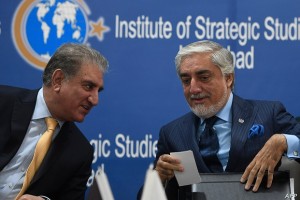
That neither country’s territory should be used for “malicious purposes” against the other’s territory, and that both countries should work together to “identify and tackle enemies of peace”.
That regional connectivity should be broadened and deepened, with an emphasis on trade, free movement of people, goods and services, opening of trade and customs posts, and transport and energy infrastructure development, aiming for regional development dividends greater than what each country might expect to achieve alone
That a safe, time-bound and dignified return of Afghan refugees from Pakistan would help the two countries address the humanitarian and socio-economic challenges associated with population displacement.
Engagement at the highest level between Islamabad and Kabul is essential for improved bilateral relations, as well as peace in the region. The exchange of high-level visits will ensure removing the lack of trust and will definitely help in achieving long-lasting peace in Afghanistan through peace negotiations.
It is worth mentioning here that with the arrival of new president of the United States of America, Mr Joe Biden, both Pakistan and Afghanistan will see new policies and strategies of America. During his tenure as vice president with President Barack H. Obama, both Pakistan and Afghanistan were linked through Af-Pak policy, thus prediction of the revival of the same strategy during Biden’s presidency is a far-fetched idea. Mr Biden has announced to reduce the number of American troops to 2500 and it has created panic among those who have being lobbying for staying the course in Afghanistan. The fate of intra-Afghan dialogue during a Biden presidency is unclear but derailing the process will unquestionably harm the strategic and political goals of the United States in Afghanistan. To get prepared for the worse scenario, both Pakistan and Afghanistan need to be on one page and the leaders must come closer together for achieving harmonized and mutually-beneficial policy of dealing with USA and other regional and global actors.
The author teaches at department of Political Science, University of Malakand, Chakdara. He can be reached at mairajulhamid717@gmail.com.
 Jahangir's World Times First Comprehensive Magazine for students/teachers of competitive exams and general readers as well.
Jahangir's World Times First Comprehensive Magazine for students/teachers of competitive exams and general readers as well.
